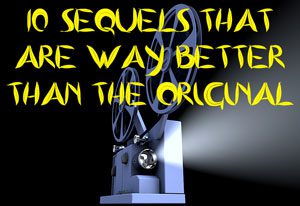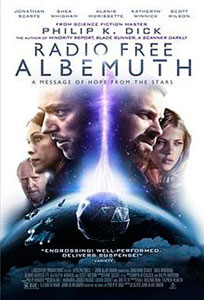“Radio Free Albemuth” (2014) perfectly illustrates the “book is always better” conundrum. The film fairly faithfully adapts Philip K. Dick’s novel (written in 1976, published in 1985) but instead of being engrossing and surprising us with one fascinating idea after another, it’s flat and slow. Part of the problem is that PKD novels are hard to adapt in a straightforward fashion (the only one more faithful than this is “A Scanner Darkly,” which is better, but has similar problems); part of it is that “RFA” has a low budget.
An admirable try
Still, I admire writer-director John Alan Simon and his team for trying. Shea Whigham and Jonathan Scarfe ably play Phil and Nicholas, roles that would be played by Steve Zahn and Val Kilmer in a big studio adaptation. Phil doesn’t remotely strike me as being Philip K. Dick, but the filmmakers obviously aren’t trying for that.
Although I sympathize with these people, who are looking for ways to subvert the evil political powers of alternate dystopian 1985, they come across as plot-movers more so than layered people. Alanis Morissette gives the most memorable performance as Sylvia, proving that – while she shouldn’t quit her singing job – she’s respectable on the screen.

“Radio Free Albemuth” (2014)
Director: John Alan Simon
Writers: John Alan Simon, Philip K. Dick
Stars: Shea Whigham, Jonathan Scarfe, Michael Rothhaar
Morissette chooses to play Sylvia as incongruously happy – considering that she has cancer and is being watched by the state’s spy apparatus — but it clicked for me when she explains that she knows about her wonderful next life via Valis.
Another “I know that face” actor, Katheryn Winnick, is decent as Nick’s wife Rachel. But too much of the supporting cast is made up of novice actors, and it shows in a handful of turns where I don’t believe the person’s motivations are coming from anywhere other than directions in a screenplay.
One area where Simon’s “RFA” can give us something that’s not in the book is through the music, and Robyn Hitchcock – who writes and performs most of the music – does good work here. The Good Listeners, who perform the subliminal song intended to let the public know that the president is a member of the Communist Party (closely based on Dick’s lyrics in the novel), have a nice sound that’s a mumbly answer to the Beatles. Morissette also has a pretty if gibberish-filled song in one of Nicholas’ dream sequences.
Minor but unnecessary changes
Simon’s changes to PKD’s work are minor, but also irksome because they are mostly unnecessary. Ferris F. Freemont is changed to Richard Freemont. (“The Walking Dead’s” Scott Wilson appropriately plays the prez in the way PKD describes, as a boring and seemingly harmless old guy.)
I’m guessing “Richard” is an allusion to Richard Nixon, but it sacrifices the “FFF = 666” code. Nick’s son Johnny becomes Ezra. Sadassa Aramchek Sylvia becomes Sylvia Aramchek Sadassa. None of these changes increase the appeal for casual viewers, but they’ll be mildly annoying to PKD fans, so it’s a lose-lose situation.

(Also distracting to me: Valis is mostly pronounced with a hard “A” sound by the actors, rather than the soft “A” that I assumed. But that’s personal preference.)
Even worse, the remixing of PKD’s real-life catalog is distracting. Notably, Phil tells Nick he’s currently working on an alternate history book about the Nazis winning WWII, but in reality, he wrote “The Man in the High Castle” decades earlier and it helped put him on the map.
Removed from the real PKD
Granted, this movie is set in 1985, after PKD had died in the real world, and he’s a relatively young guy here, so from the get-go, this Phil is much further removed from the real PKD than the novel version, which is set in the 1970s. Simon could’ve set “RFA” in present day by changing the pivotal song to a digital release (as it stands, he changes it from a record to a CD) and not had to worry about any other period touches.
Nicholas and Rachel live in a nice 1985 house – as per his record-exec job – but they fill out a mandatory government loyalty test at one point. Even knowing the scene from the book, I was caught off guard by how normal this world looks. “RFA” opens with a soldier standing atop a building and ends with the same shot, but the film’s Los Angeles doesn’t look dystopian. Granted, one could argue that’s the point – slowly encroaching oppression and all.
PKD fans are likely the only people who will appreciate the film version of “Radio Free Albemuth.” If I was watching this in a vacuum, not knowing it comes from a PKD novel (which I recently read and loved), I wouldn’t get past the drab style. But we were never going to get a movie adaptation of “Radio Free Albemuth” outside of Simon’s passion project, so I tip my cap to him and his crew for giving it a fair shot with their limited means.

